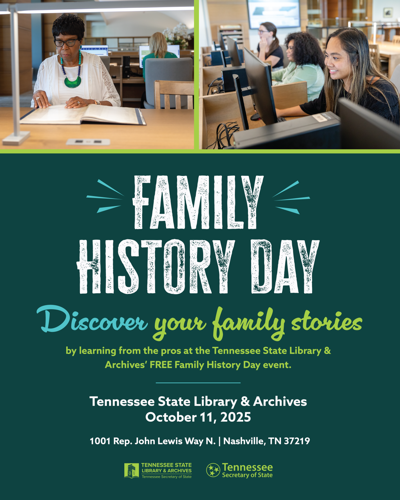Genealogy enthusiasts invited to learn how to trace Revolutionary War patriots, transcribe history, and explore family roots

The Tennessee State Library & Archives invites the public to its free annual Family History Day on Saturday, October 11, 2025, at 9:30 a.m., offering an engaging day of historical discovery, hands-on activities, and expert research assistance to help connect patrons to their family history and heritage.
This year’s featured speaker is MerryAnne Pierson, a nationally recognized genealogist and longtime Tennessee resident, who will present “Researching Your Revolutionary War Patriot.”
In her talk, Pierson will guide attendees through a wide range of resources available for discovering Revolutionary War ancestors—including digital archives, military records, land grants, published genealogies, and more.
Her presentation will emphasize research strategies for identifying patriots from the original 13 colonies and will highlight contributions from Indigenous peoples, enslaved and free Black soldiers, and other often-overlooked figures of the Revolutionary era.
“As the premier genealogical resource center in Tennessee, TSLA offers a pathway for patrons to not only discover their ancestors, but also uncover their stories,” said Secretary of State Tre Hargett. “Getting to learn about the research process with Ms. Pierson will help connect Tennesseans with the tools and resources available to them through the Library & Archives that can support their research endeavors.”
Pierson’s credentials in genealogical research are extensive. A retired surgical nurse and Ohio native, she has pursued genealogy with scholarly rigor, earning certifications from the National Genealogical Society, Boston University, and the Daughters of the American Revolution (DAR).
She currently serves as the Tennessee DAR Lineage Research Chair and is active in several other heritage organizations, including the Mayflower Society and the United States Daughters of 1812.
Family History Day is more than just a lecture—it’s a celebration of discovery. Throughout the day, attendees can participate in a “Transcribe-a-thon,” helping to make digitized historical records more accessible to researchers by transcribing original documents from the Library & Archives’ vast collections.
“Our team is ready year-round to support researchers in their search for knowledge about their ancestors,” said Tennessee State Librarian and Archivist Jamie Ritter. “We are looking forward to seeing what special mementos and records people bring along with them, so we can help share preservation tips that help protect their items.”
Public Services staff and volunteers will also be on hand to assist guests with their genealogical research, offering personalized guidance and access to unique Tennessee records and databases.
New this year, visitors can also take part in “Ask an Archivist,” an opportunity to bring questions about Library & Archives collections or their own family treasures.
While staff cannot provide appraisals, they will share practical advice on preserving photos, letters, and other cherished materials for future generations.
The event is free and open to the public, but registration for the presentation is required. To reserve your seat, access Eventbrite by clicking here.
The Library & Archives is located at 1001 Rep. John Lewis Way North on the northeast corner of Bicentennial Capitol Mall State Park, across from the Tennessee State Museum. Parking is available for guests in the Library & Archives garage on Junior Gilliam Way.
The Library & Archives is also open for research throughout the year, Tuesday through Saturday, from 8 a.m. to 4:30 p.m. CT. The interactive exhibit lobby is open to the public Monday through Saturday, from 8 a.m. to 4:30 p.m. CT.
For more information, visit: Plan Your Visit | Tennessee Secretary of State (tn.gov). For more information about the Library & Archives, call 615-741-2764, email ask@tsla.libanswers.com, or visit https://sos.tn.gov/tsla.
 Latest News Articles
Latest News Articles Do you have an RSS newsreader? You may prefer to use this newsletter's RSS feed at:
Do you have an RSS newsreader? You may prefer to use this newsletter's RSS feed at: